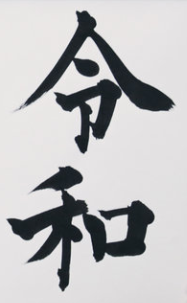 The Japanese government has announced last night that the name of the new Japanese era will be Reiwa (令和).
The Japanese government has announced last night that the name of the new Japanese era will be Reiwa (令和).
Each time that there is a new emperor, Japan’s calendar start a new era (時代 / jidai) or period (元年 / gannen). The era name (年号 / nengō or 元号 / gengō) is always selected carefully and has a great cultural significance. However, today it is mainly used only on government official paperwork (driving licenses, official calendar, etc.). Everyday use generally follows the Gregorian calendar. The previous era of modern Japan are Meiji (Prince Mutsuhito, 1868-1912), Taishō (Prince Yoshihito, 1912-1926), Shōwa (Hirohito, 1926-1989) and Heisei (Akihito, 1989-2019). Reiwa will be the 248th era name of Japanese history.
This change usually happens upon the death of the emperor, as his son ascend to the Chrysanthemum Throne. However, this time, the emperor Akihito chose to abdicate for health reason on April 30th and he will be succeeded by his elder son, Naruhito, on May 1st. Another departure from tradition is the fact that, in the past, the name was inspired by Chinese literature. This time, the panel of experts selected to choose the name took the idea from Japanese classical literature, as it is derived from the ancient poem anthology Man’yōshū.
The first character of the name, Rei [令], means good fortune (the “auspicious wave of energy of the plum blossoms carried by the wind”) and the second character, Wa [和], means gentle, harmonious or peace and tranquility. It could therefore be translated as “fortunate harmony” or “auspicious harmony” (although some seems to translate it as “redolent harmony”).
The announcement was well received by the Japanese as they expect the name to embody their hope for a better future…
[ Traduire ]